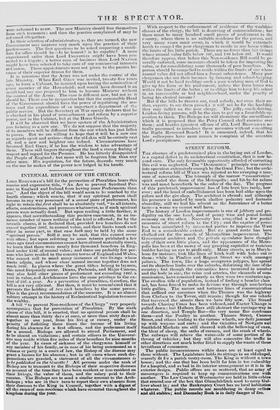INTERNAL REFORM OF THE CHURCH.
LORD BROUGHAM'S bill for the prevention of Pluralities bears this concise and expressive title, "An Act to prevent Spiritual Per- sons in England and Ireland from having more Preferments than one." And the object of the bill would seem to be reached by the
fourth clause; which enacts, that if any spiritual person shall become in any way possessed of a second piece of preferment, his right to retain thefirst shall be as absolutely void, "to all intents,
effects, constructions, and purposes whatsoever, as if such spiritual person were actually dead." But upon reading a little further, it appears, that notwithstanding this positive enactment, in an im- mense number of cases nothing of the kind is effected; for by the seventh clause, it is declared that, provided two benefices do not exceed together 3001. in annual value, and their limits touch each
other in some part, in that case both may be held by the same "spiritual person." Still it may be said, that this cannot occur
very often ; but upon referring to some returns published a few years ago (and circumstances cannot have altered materially since), we learn that there were nearly four thousand benefices in Eng- land under 1501. of annual value; and there are probably few per- sons who have resided in the country towns of England and Wales, who cannot call to mind many instances of two livings whose limits adjoin, and whose clear annual income together does not reach 300/. In places where the great tithes belong to laymen, this must frequently occur. Deans, Prebends, and Major Canons, may also hold other pieces of preferment not exceeding 100/. a year in value, and Archdeacons have the same privilege to the ex- tent of 20/. a year. As a prevention of pluralities, therefore, the
bill is not very efficient. But then, it must be remembered that it prevents the bolding of two rich benefices by the same person. This is the great recommendation of the measure. It is an almost solitary attempt in the history of Ecclesiastical legislation to coerce the wealthy.
A bill "to prevent Non-residence of the Clergy" very properly accompanies that for prevention of Pluralities. By the sixth clause of this bill, it is enacted, that no spiritual person shall be absent more than thirty days at once, or more than sixty days al- together in one year, from his livieg or curacy, under the penalty of forfeiting three times the income of his living during his absence for a first offence, and the preferment itself for a second. Bishops are allowed to attend Parliament, and
to be absent on visitations ; and certain officers in the Universi- ties may reside within five miles of their benefices for nine months of the year. In cases of sickness of the clergyman himself or any member of his family, or in case of his being summoned as a witness or party in a court of law, the Bishop of the diocese may grant a licence for his absence ; but in all• cases where such dis- pensationa are granted, a statement of all the circumstances is to be published in the Gazette! All persons under the rank of Bishop are to transmit to the Bishops of their respective dioceses an account of the time they have been resident or non-resident on their livings, the value of them, and the salary paid to their curates. The Bishops are to send a similar account to the Arch- bishops ; who are in their turn to report their own absence from their dioceses to the King in Council, together with a digest a all the cases of non-residence which have occurred throughout the kingdom during the year. With respect to the enforcement of residence of the wealthier classes of the clergy, the bill is deserving of commendation ; but there must be many hundred small pieces of preferment in the c nintry, where there is no suitable residence for the parson, and very many cases must occur, in which it would be extremely harsh to comps' the poor clergyman to reside in any house within the limits of his little parish. There are no fewer than 350 livings whose annual value falls below 40/.. and 190 below 30/. It would therefore appear, that before this Non-residence Bill could be ge- nerally enforced, some measures should be taken for improving the value, or for consolidating some thousands of poor benefices. No person should be compelled to reside within the limits of one whose annual value did not afford him a decent subsistence. Many poor clergymen eke out their incomes by farming and school-keeping. Would it not be hard to oblige such a poor working man of God to give up his farm or his preferment, unless the farm house was within the limits of the latter ; or to oblige him to keep his school in an inaccessible or bad neighbourhood, under the penalty of losing his clerical income ?
But if the bills be thrown out, (and nobody, not even their au- thor, expects to see them passed,) it will not be for the hardship they may inflict on the poor clergy. The jolly, coach-driving, London-living parsons, will be the men to get up a formidable op. position to them. The Bishops too will abominate the surveillance which it is proposed that the Privy Council shall exercise over them ; and besides (greatest offence of all), Lord BROUGHAM ac- tually presumed to introduce these measures without consulting the Right Reverend Bench It is rumoured, indeed, that his late colleagues have more reason to complain of the eccentric Lord's precipitance.




















 Previous page
Previous page